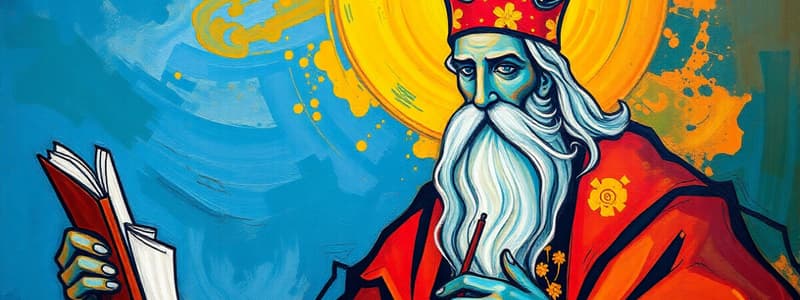Podcast
Questions and Answers
What theological problem did defenders of poetry face?
What theological problem did defenders of poetry face?
- The existence of moral truths outside theology.
- The role of the Holy Spirit in inspiration. (correct)
- The interpretation of pagan writings.
- The authority of biblical teachings.
Why did defenders of poetry incur hostility from conservative clerics?
Why did defenders of poetry incur hostility from conservative clerics?
- They supported suspiciously deistic teachings. (correct)
- They proposed mathematical interpretations of scripture.
- They relied on emotional rather than rational arguments.
- They disregarded the authority of the Bible.
What type of readings did the defenders of poetry claim for their teachings?
What type of readings did the defenders of poetry claim for their teachings?
- Esoteric insights exclusive to poetry.
- Moral and cosmological readings. (correct)
- Literal interpretations of biblical texts.
- Complex historical analyses of pagan works.
What was a common characteristic of the teachings claimed for poetry?
What was a common characteristic of the teachings claimed for poetry?
What idea about pagan authors did defenders of poetry largely accept?
What idea about pagan authors did defenders of poetry largely accept?
What does Dante classify in his letter to Can Grande Della Scala?
What does Dante classify in his letter to Can Grande Della Scala?
Which work does Dante's letter serve as an introduction to?
Which work does Dante's letter serve as an introduction to?
Who is Dante addressing in his letter regarding the literary elements?
Who is Dante addressing in his letter regarding the literary elements?
Who authored the book 'Beginning Theory: An Introduction to Literary and Cultural Theory'?
Who authored the book 'Beginning Theory: An Introduction to Literary and Cultural Theory'?
What role did the defense of poetry serve in relation to secular criticism?
What role did the defense of poetry serve in relation to secular criticism?
In the context of Dante's literary classification, what is the significance of the letter's content?
In the context of Dante's literary classification, what is the significance of the letter's content?
What is the focus of Christopher Baswell's work titled 'Virgil in Medieval England'?
What is the focus of Christopher Baswell's work titled 'Virgil in Medieval England'?
What is NOT a focus of Dante's classification in the letter?
What is NOT a focus of Dante's classification in the letter?
In what year was 'Virgil in Medieval England' published?
In what year was 'Virgil in Medieval England' published?
Which group was particularly inspired by the defense of poetry mentioned in the content?
Which group was particularly inspired by the defense of poetry mentioned in the content?
What can be inferred about the nature of the defense of poetry in relation to humanism?
What can be inferred about the nature of the defense of poetry in relation to humanism?
Which academic focus is discussed in Peter Barry's work?
Which academic focus is discussed in Peter Barry's work?
What major literary work is central to Baswell's examination?
What major literary work is central to Baswell's examination?
In the context provided, what does the term 'stronghold' imply about poetry?
In the context provided, what does the term 'stronghold' imply about poetry?
How did the defense of poetry affect the intellectual climate of the medieval era?
How did the defense of poetry affect the intellectual climate of the medieval era?
Who is the author of the commentary on 'De nuptiis Philologiae et Mercurii'?
Who is the author of the commentary on 'De nuptiis Philologiae et Mercurii'?
What is the title of the work that Bernard commented on?
What is the title of the work that Bernard commented on?
Which edition of the commentary is cited?
Which edition of the commentary is cited?
What type of work is 'Reductorium morale' associated with?
What type of work is 'Reductorium morale' associated with?
Who edited the work by Silvester Bernard?
Who edited the work by Silvester Bernard?
Who is the author of 'Lollards and their Books'?
Who is the author of 'Lollards and their Books'?
In what year was 'The Introductions to the Artes in the Twelfth Century' published?
In what year was 'The Introductions to the Artes in the Twelfth Century' published?
Where were the works of Anne Hudson and R.W. Hunt published?
Where were the works of Anne Hudson and R.W. Hunt published?
What is the main theme of Anne Hudson's work as suggested by its title?
What is the main theme of Anne Hudson's work as suggested by its title?
What is the significance of the year 1948 in relation to R.W. Hunt's work?
What is the significance of the year 1948 in relation to R.W. Hunt's work?
Flashcards
Poetry's theological problems
Poetry's theological problems
Complex religious issues related to poetry and its interpretation.
Holy Spirit's inspiration
Holy Spirit's inspiration
The belief that the Holy Spirit inspired pagan poets.
Conservative clerics' hostility
Conservative clerics' hostility
Opposition from religious leaders who viewed certain interpretations of poetry as unorthodox.
Deistic teaching
Deistic teaching
Signup and view all the flashcards
Secular Criticism
Secular Criticism
Signup and view all the flashcards
Poetry's perceived challenge to the Bible
Poetry's perceived challenge to the Bible
Signup and view all the flashcards
Medieval Humanists
Medieval Humanists
Signup and view all the flashcards
Defense of Poetry
Defense of Poetry
Signup and view all the flashcards
Inspiring Force
Inspiring Force
Signup and view all the flashcards
Stronghold
Stronghold
Signup and view all the flashcards
Dante's Letter to Can Grande
Dante's Letter to Can Grande
Signup and view all the flashcards
Literary Elements
Literary Elements
Signup and view all the flashcards
Classification of Elements
Classification of Elements
Signup and view all the flashcards
Introduction to "Paradiso"
Introduction to "Paradiso"
Signup and view all the flashcards
Dante's Literary Approach
Dante's Literary Approach
Signup and view all the flashcards
Beginning Theory
Beginning Theory
Signup and view all the flashcards
Virgil in Medieval England
Virgil in Medieval England
Signup and view all the flashcards
Literary and Cultural Theory
Literary and Cultural Theory
Signup and view all the flashcards
Medieval English Literature
Medieval English Literature
Signup and view all the flashcards
The * Aeneid*
The * Aeneid*
Signup and view all the flashcards
Lollards
Lollards
Signup and view all the flashcards
Studia medievalia
Studia medievalia
Signup and view all the flashcards
Artes
Artes
Signup and view all the flashcards
Introductions to the Artes
Introductions to the Artes
Signup and view all the flashcards
Twelfth Century
Twelfth Century
Signup and view all the flashcards
Bernard, Silvester
Bernard, Silvester
Signup and view all the flashcards
Commentary
Commentary
Signup and view all the flashcards
'De nuptiis Philologiae et Mercurii'
'De nuptiis Philologiae et Mercurii'
Signup and view all the flashcards
Reductorium morale
Reductorium morale
Signup and view all the flashcards
Ovidius moralizatus
Ovidius moralizatus
Signup and view all the flashcards
Study Notes
Medieval and Renaissance Literary Criticism
- Preface: English literary consciousness began in the Middle Ages. This course outlines the early stages of criticism, encompassing European influences, not just vernacular writers. It's a key to understanding 16th-century Renaissance literature. The Middle Ages were often misunderstood as lacking criticism.
- Medieval Criticism: The period between the Classical and Renaissance ages, encompassing eight centuries in England, from Beowulf's composition to Caxton's first printed book (725 AD - 1474 AD). A key development was the adoption of Christianity in the Mediterranean region. Medieval literature was classified under grammar, rhetoric, and poetry, with a focus on systematic poetic grammar.
- Renaissance Criticism: The 14th–16th centuries in Europe, characterized by a rebirth of classical learning and a shift from religious to secular themes. The term is associated with Italian origins. Two viewpoints exist: one posits a revival of classical Greek and Roman greatness after the Middle Ages, while the other sees a gradual progression from medieval to Renaissance thought and culture. There's a focus on man's inherent dignity and divinity.
- Literary Criticism in the Renaissance: Renaissance criticism sought to justify imaginative literature. Literature was not judged by critical standards. It aimed to establish criteria for evaluating past works and answer Plato's objections. Important critics were Petrarch, Scaliger, Minturno, Boccaccio, and Sidney.
- Literary Criticism (Medieval): Focuses on the integration of classical and Christian beliefs. Key critics and works included Augustine, Isidore of Seville, and the Venerable Bede, and his Historia ecclesiastica gentis Anglorum. Critical engagement was heavily influenced by biblical interpretation.
- Poetics in the Tudor Age: The lack of explicit literary theories in England during the Middle Ages contrasted with the growing influence of Italian Humanist thought in the 16th century. Key texts of the period included Chaucer's The Nun Priest's Tale and works by William Caxton
- English Humanism around 1500: The early English humanists, like Elyot, Wilson, and Ascham, sought to adapt and apply humanist principles from Italy to England, focussing on adapting classical styles to the English vernacular. Key concern was English style, and criticism of verse forms and content.
- Early Defenses of Poetry: The 16th century witnessed defenses of poetry, most notably by Sidney. This period saw a mix of praise for classical forms and an emerging sense of indigenous, "native" English literary values
- The Early 17th Century (Criticism): This period saw a rise in criticism by authors like Ben Jonson (literary criticism in relation to his plays). Jonson and his contemporaries championed neoclassical ideals in drama and defended the role of playwriting as an important vehicle for social and political commentary, contrasting with purely aesthetic concerns.
- The Age of Milton (Criticism): Milton's critical standpoint was influenced by the English Civil War and the Commonwealth, with a focus on poetry's role in shaping civic virtue and challenging political authority.
- Continental Critics: Focused on adapting classical approaches to the English language and style. These critics included Julius Caesar Scaliger, and Ludovico Castelvetro, who explored concepts of decorum, imitation, and the function of poetry.
- Three Traditions of Critical Thought Mingle in Sidney: Horatian-Aristotelian tradition, Cicero, and neo-Platonic ideals, influencing Sidney's approach. It reflects a syncretic approach.
- Poetry in the Rennaissance: Shifting from largely allegorical or religious interpretations towards aesthetic exploration of ideas that were either moral or worldly/worldly and moral
Questions
- Key questions regarding Medieval and Renaissance literary theory and criticism are provided. Questions cover Neoplatonism, St. Augustine, Dante, Boccaccio, and other notable figures. Specific issues and theories in literary criticism, like the concept of Imitation, are also discussed.
Studying That Suits You
Use AI to generate personalized quizzes and flashcards to suit your learning preferences.




